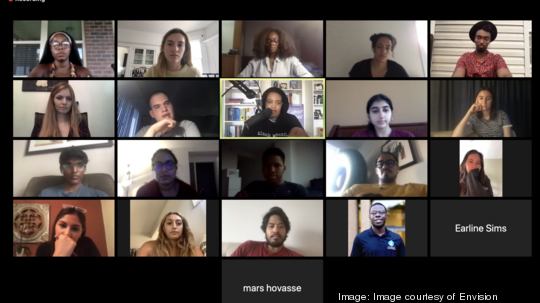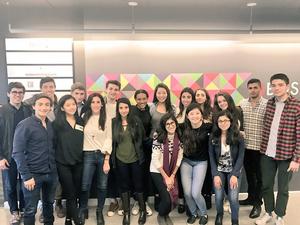
Seventeen startups from across the country just graduated from the inaugural cohort of Envision, a brand-new, student-founded startup accelerator for students and recent college graduates.
Among the startups that graduated from the program was Holdette, a women's workwear company out of Boston University that aims to launch its first line of suits this year. Another was Justice Text, a startup that makes video evidence management software intended to produce fair outcomes in the criminal justice system. The companies received eight weeks of one-on-one mentorship, workshops like "Fundraising 101" and more than 90 hours of office hours with legal and accounting experts. Each had the opportunity to share their stories and pitch decks to potential investors, advisors and members of the press via a password-protected website at the end of August.
"Envision’s inaugural cohort of 17 companies has made incredible progress on their products, grown their teams and perfected their pitches," the Envision team wrote on the site. "The results speak for themselves."
That was last week. But it was only a few months ago that Envision even came into existence.
In March, Brown University senior Annabel Strauss and Northeastern University sophomore Eliana Berger were kicked off their respective campuses in the initial flurry of coronavirus-driven shutdowns. Strauss went home to San Francisco; Berger stayed on the East Coast. Despite their distance, the two found each other in a Slack channel for student founders, and they quickly bonded over their shared passion for elevating traditionally underrepresented groups in the typically white and male world of venture capital.
Then, in June, that passion became the discussion of the entire startup community. Spurred by the police killing of George Floyd and brutality against countless others, leaders in tech and venture capital began to question their role in upholding racist systems—and discuss how they might fix it.
Berger already had an idea in the back of her mind. Now, she thought, could be the time to enact it.
"Eliana came to me and was like, 'Hey, I want your feedback on this: What if there were a summer accelerator for underrepresented founders?'" Strauss said. "Within three days, we built our team of 10 students who were, like us, involved in VC and entrepreneurship at their respective schools. Our whole team came together virtually."
Today, the Envision team includes students from Harvard University, Brown, the University of Southern California, the University of Michigan Ross School of Business, Northeastern, Vanderbilt University, Harvard Business School (HBS) and Tufts University. They have never met in person, but what they've been able to accomplish in a short time is astounding.
The co-founders set an ambitious goal at the beginning of the summer: They wanted to launch their accelerator on July 6. That meant they had less than one month to find mentors, bring in and then review applications, develop curricula and, crucially, raise enough money to provide each team with $10,000 in non-dilutive grant funding. (Envision is registered as a 501(c)3 nonprofit.)
The team did it all.
Envision's founding team raised $150,000 for the accelerator. They brought on more than 80 mentors. They received about 200 applications and selected the inaugural cohort of 17 companies—all in time for the July 6 launch.
"And then the rest was history," Strauss said.
Envision's accelerator is industry-agnostic, but it's "optimized" for software startups and companies that want to be venture-backed, Berger said. A main goal of the program is to get participating companies access to capital, particularly because the kinds of founders Envision aims to elevate—women and entrepreneurs of color—have been underserved by VC. In Envision's first cohort, about one-third of the founders are Black and more than three-quarters have at least one female founder.
The schools represented by the cohort include Ivy Leagues like Brown and Princeton, but they also include the historically Black Morehouse College and Montego Bay Community College in Jamaica. Strauss said the team reached out specifically to HCBUs and women's colleges to ensure a diverse set of founders.
"We didn't want to go out after the Harvards and Stanfords of the country," Strauss said. "That's one reason we didn't want to affiliate with a school or a venture fund. Our whole point is democratizing outreach."
To date, Envision says, the companies in Envision's first cohort have booked meetings with Sequoia Capital, Hustle Fund, Lerer Hippeau, The Venture Collective and Corigin Ventures, the team said, and their mentors have included Arlan Hamilton of Backstage Capital, Peter Boyce of General Catalyst, Ryan Hoover of Product Hunt and Lolita Taub of Indie.vc.
The team is now in the process of raising funds for a second cohort set to launch in the fall. Applications will launch this Friday, Sept. 4, with the 10-week program slated to begin in October.
In the meantime, Envision's founding team will, for the most part, continue to double- or triple-duty, as many of them go back to school and juggle part-time and full-time jobs. But for most of the team, that's nothing new. Berger has been involved with student-focused VC firm Contrary Capital for more than two years, while Strauss is involved with General Catalyst's Rough Draft Ventures. Kim Patel, Envision's head of operations and an MBA candidate at HBS, is also an investor at Lerer Hippeau and a venture partner at HBS's Arthur Rock Center for Entrepreneurship.
The Envision team was volunteer-only to begin with, but they are now approaching their next fundraise with the core team in mind in addition to the grants each startup receives. Strauss and Berger are aware that they've been privileged to work on Envision without pay; if they want the opportunity to truly be open to a diverse group of entrepreneurs, the role needs to come with compensation.
"Socio-economic, racial, college major—every axis of diversity is really important," Strauss said. "We are constantly taking that into account."







